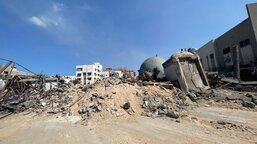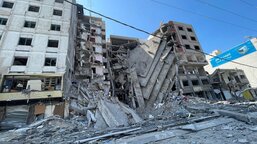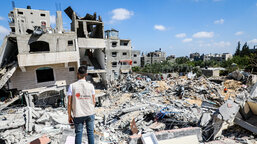The consequences of the newly escalated conflict between Israel and Hamas are hitting the civilian population the hardest. The escalation of the conflict has worsened the already dire humanitarian situation in Gaza. We spoke about the current situation to Harout Bedrossian from Caritas Jerusalem, which has long been helping in the Gaza Strip and has 100 employees in Gaza.
What is the current situation in the Gaza Strip?
The situation is one of fear. The bombing continues, and the death and injury toll is rising. Unfortunately, most of the victims on both sides are civilians, innocent children, women and men. The vast majority are innocent civilians who have nothing to do in the war and should not be in it. Also, most of the objects that are targeted are civilian buildings, hospitals, mosques, churches, schools or medical centres. It is just crazy.
You know, I have been working at Caritas Jerusalem since 2011. So, I had the misfortune of managing 4 conflicts before. The one in 2014 was the heaviest and lasted 50 days. But the conflict that is going on today is even more vicious than those 50 days combined. And the thing is, previously, we had signs that there was going to be a war. There are triggers of a war that we in Jerusalem unfortunately know about so that we can get prepared. But this time, it was very sudden and no one was ready. No one was prepared not only for the escalation of the conflict, but also for the level of violence from both sides. The level of violence and the level of shedding innocent blood is truly vicious. We hear of atrocities all the time. It is heartbreaking.
However, one piece of good news is the recent opening of the humanitarian corridor through which much-needed aid is flowing into the Gaza Strip. The humanitarian trucks delivered basic food items and drinkable water, but no fuel that is critically needed in Gaza. There is no electricity that has been cut off two weeks ago, although even before the escalation, electricity was only available for a maximum of four hours a day. But today, the people of Gaza do not even have that. The hospitals have generators, but they are running out of fuel.
There are many employees of Caritas Jerusalem currently in Gaza. Are you in contact with them?
Yes, of course, we are in contact on a daily basis. We have around 100 employees in Gaza. Most of them are medical teams, doctors, nurses, lab technicians, and pharmacists. Caritas Jerusalem has a medical centre in Gaza, and we currently have 15 mobile medical teams; each team has a doctor, nurse, pharmacist, lab technician, and they visit community-based organisations where we provide primary health care to people living far away from Gaza city, who cannot come themselves to the Caritas centre. Of course, we have had to suspend all our activities due to the escalation of the conflict because it is not safe. And even if it were safe, the destroyed infrastructure will not allow us to move on until things improve.
How do your colleagues describe the humanitarian situation in Gaza?
My colleagues are in complete shock. They are really exhausted and traumatised. We talk to them every day to give them moral support, to ask them how they are doing, if they need anything. We hear very sad stories from them. We ourselves now need psychosocial support so that we can best support our colleagues. Everyone we speak to has had to move out of their homes. They are taking refuge in various shelters, including churches. But you know what happened last week, when an airstrike aimed at a building adjacent to the Greek Orthodox Church of St Porphyrios took the lives of up to twenty people, including our dear colleague and her family.
Unfortunately, communication with our colleagues is becoming increasingly difficult. Because of the attacks on the telecommunications infrastructure, it is difficult to reach people in Gaza by telephone. Antennas are becoming scarce after the attacks. It is one thing that they are not able to receive a signal, but they are also unable to charge their phones because the electricity supply has been cut off. The people of Gaza are used to using generators, but they need fuel, and that is running out.
The humanitarian situation in Gaza reached catastrophic levels. What do the people of Gaza need most now?
Lots of things are needed. People in Gaza need food, they need clean drinking water, which is running out. They need electricity, and they need fuel for generators, especially for hospitals, which do not have enough fuel. There is also a shortage of medicines in Gaza; imagine people getting injured and not being able to get any tranquilliser of pain killer.
Most people in Gaza have had to leave their homes. The number of displaced people has risen to 1.4 million. These people need blankets, mattresses, dignity kits, dried food packages. Of course, they also need immediate medical and psychosocial assistance. Caritas Jerusalem is ready to provide this assistance as soon as the security situation allows. Our colleagues are well-trained to work in emergency situations. We have already provided them with first aid packages and some basic medicines so that they can distribute them in emergencies. But of course, this is just a drop in the ocean of what they can do. They, too, are very traumatised and have to cope with the effects of the conflict.
Is there anything else you would like to add or mention?
I would like to say that we really appreciate your support. I especially want to emphasise that it is not the money, not the products, it is the message for Gaza and for the people in the Holy Land. It is important for them to see and hear that there are people out there who care about them. That they are not alone. You know, it is a small light at the end of the tunnel. It is a little hope that we give to them that there are still good people out there who care about them. Because these people, especially children, have grown up in war. You talk to a 12-year-old boy who has lived through four wars. It is really madness. So thank you very much for your support to all those who have not forgotten about the local people.
Caritas Czech Republic has launched a fundraising appeal to help affected civilians in the Gaza Strip. They urgently need immediate and safe access to basic humanitarian aid, including medical care. Caritas Jerusalem, which currently has 100 staff on the ground in Gaza, has long provided this assistance.
DONATE AND HELP PEOPLE IN GAZA












